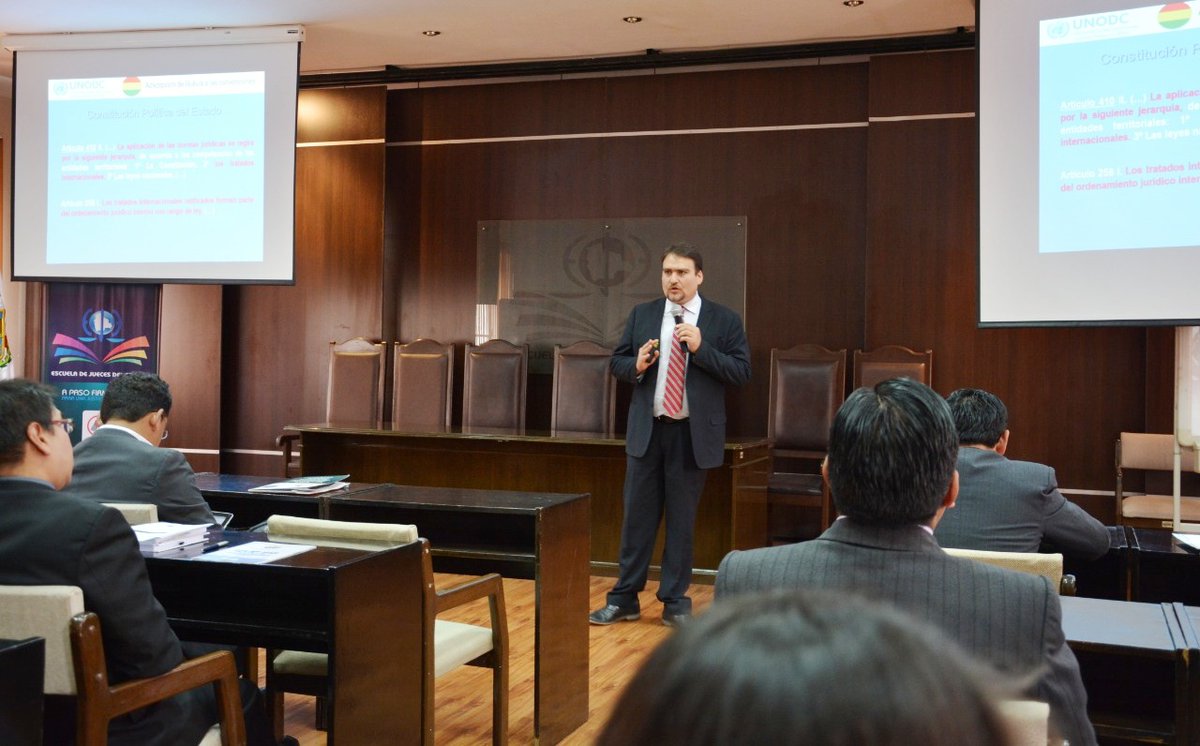
 18- 25 March 2019 - The Vice Ministry of Social Defense and Controlled Substances and the United Nations Office on Drugs and Crime (UNODC), in coordination with the Schools of Judges and Prosecutors, inaugurated a cycle of training on asset forfeiture linked to drug trafficking. The training addressed to authorities of the Supreme Court of Justice, Constitutional Court, State Attorney General's Office, and Special Force to Fight Drug Trafficking
18- 25 March 2019 - The Vice Ministry of Social Defense and Controlled Substances and the United Nations Office on Drugs and Crime (UNODC), in coordination with the Schools of Judges and Prosecutors, inaugurated a cycle of training on asset forfeiture linked to drug trafficking. The training addressed to authorities of the Supreme Court of Justice, Constitutional Court, State Attorney General's Office, and Special Force to Fight Drug Trafficking
During the opening ceremony, the Vice Minister of Social Defense and Controlled Substances, Felipe Cáceres, stressed that after two years of the implementation of Law No. 913, there are already national experts with the capacities to conduct the training and introduce general concepts and topics, such as : the nature of the action, the procedural subjects, the development of the process, the difference of the loss of ownership with criminal confiscation and the legitimization of illicit profits.
The cycle of training will have a national scope and will take place in several cities in Bolivia stating with Sucre, La Paz, Cochabamba, and Santa Cruz. In these activities, the participation of criminal justice officers, in charge of the implementation of Law No. 913, is expected.
Asset forfeiture is a tool of criminal policy that seeks to complete the set of institutional and legal measures adopted by Bolivia to fight against drug trafficking. This tool will allow the State to prosecute all kinds of illicit goods derived from crimes related to drug trafficking.
 The training cycle is carried out within the framework of the UNODC Support Program for the Implementation of the Plan of Action of the Strategy to Combat Drug Trafficking and Reduction of Coca Surplus Crops of the Plurinational State of Bolivia, financed by the European Union and Denmark, as well as the UNODC CRIMJUST Global Programme Project for Strengthening Capacities for Investigation and Judicialization along the Cocaine Route in Latin America, the Caribbean and West Africa.
The training cycle is carried out within the framework of the UNODC Support Program for the Implementation of the Plan of Action of the Strategy to Combat Drug Trafficking and Reduction of Coca Surplus Crops of the Plurinational State of Bolivia, financed by the European Union and Denmark, as well as the UNODC CRIMJUST Global Programme Project for Strengthening Capacities for Investigation and Judicialization along the Cocaine Route in Latin America, the Caribbean and West Africa.
CRIMJUST technical assistance in Bolivia is based on coordination, collaboration, synergies, and cross-fertilization with existing projects within UNODC, as well as with other relevant regional cooperation initiatives. As a result, UNODC continues to support the government of the Plurinational State of Bolivia in the development of its new regulatory framework on drugs, complying with its mandate to provide legal technical assistance to the States party to the Narcotics Control Conventions of the United Nations.
Under the framework of the CRIMJUST project funded by European Union Cocaine Route Programme, UNODC and its partners (INTERPOL and TI) aim to assist Member States to enhance their capacity and integrity of criminal justice institutions to detect, investigate, prosecute and adjudicate illicit cocaine trafficking cases, and to foster cooperation at the interregional level for effective action to tackle drug trafficking and related organized crime.
For more information:
- European Union "Cocaine Route Programme"
